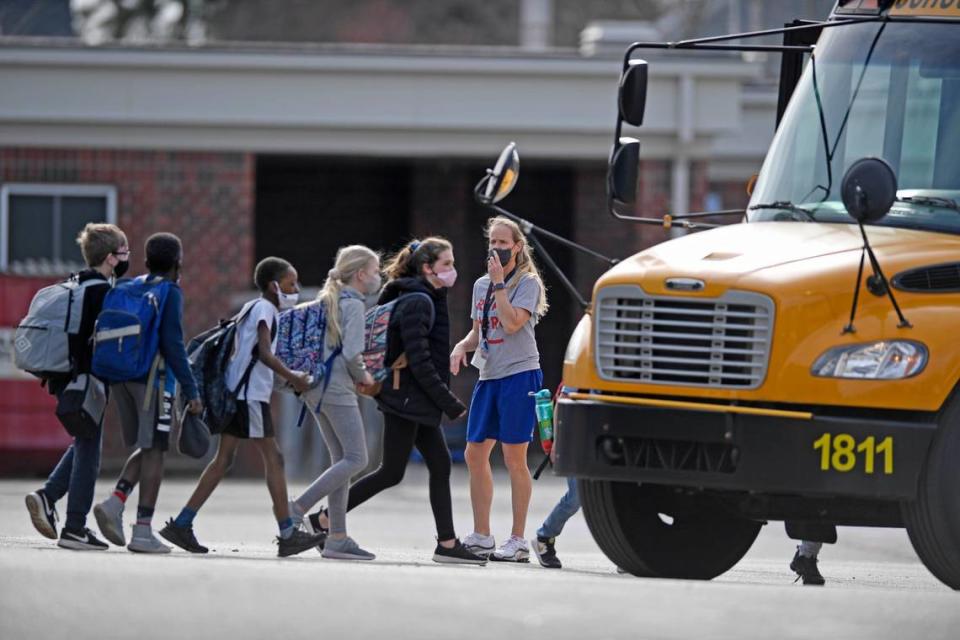Just before schools reopen, Charlotte sees ‘dramatic uptick’ in COVID cases in kids
- Oops!Something went wrong.Please try again later.
Three weeks before many Mecklenburg County kids return to school, one Charlotte doctor warned about a “dramatic uptick” in COVID-19 cases among children.
Novant Health has seen that big increase in COVID-19 cases among kids in the last two weeks, Novant pediatrician Dr. Catherine Ohmstede told reporters Thursday. In fact, the rate of increase looks similar to the speed of the spike in cases reported in January, she said.
In January, Mecklenburg County was reporting its highest ever rate of daily increases in COVID-19 cases and hospitalizations on average.
Now, across Mecklenburg County, one in five COVID-19 cases is in children under the age of 18, county Public Health Director Gibbie Harris told county commissioners Wednesday night.
“Our clinics across the community have been incredibly busy diagnosing COVID in children,” Ohmstede said Thursday. And coronavirus cases are increasing across all age groups of children, she said.

“This week I’ve seen babies, toddlers, school-aged children and teenagers, across the board come in with COVID diagnoses and COVID symptoms,” Ohmstede said.
In many cases, school-aged children aren’t eligible to get the COVID-19 vaccines.
No vaccine is available for use in kids under the age of 12, and only the Pfizer vaccine is available for use in kids age 12 to 17.
The delta variant
Mecklenburg County and the state are also seeing a spike in COVID-19 cases among adults.
Infections in kids typically lag behind adult infections by about two to four weeks, Ohmstede said.
The uptick in cases in the county and state across all age groups has been attributed to low vaccination rates and the increase of cases of the highly contagious delta variant of the coronavirus.
The symptoms of the delta variant, which now makes up the majority of COVID-19 cases in the U.S., are different from other variants of the virus, Ohmstede said.
“The delta variant looks like a cold,” she said. “We don’t see as many cases that have the telltale loss of taste and smell that we associate with COVID.”
Ohmstede said some symptoms of the delta coronavirus variant include coughing, sneezing, runny nose, sore throat, upset stomach, headache and fatigue, and possibly a fever.
It’s not yet clear if the delta variant could lead to more severe symptoms in children, she said.
That’s because some severe illnesses from COVID-19 in kids, like multisystem inflammatory syndrome, or MIS-C, typically presents a month after the first symptoms, according to Ohmstede.
Masks in schools
Last week, the Centers for Disease Control and Prevention issued new guidelines, recommending that even fully vaccinated people should begin wearing masks when indoors in public again.
That’s because research shows fully vaccinated people can still transmit the delta variant, CDC Director Dr. Rochelle Walensky said.
That includes in schools. Everyone in K-12 schools, including teachers, staff, students and visitors should wear a mask indoors, regardless of vaccination status, she said.
The Charlotte-Mecklenburg school board voted Friday to require masks indoors at school this fall, even as other nearby school boards took opposing stands.
A number of districts, including Mooresville, Caldwell, Gaston, Watauga and Union counties, have made masks optional, the Observer reported. In Cabarrus County, masks are optional but mandatory for all bus riders.
Ohmstede said it’s clear universal masking works. When masks have been universally worn in classrooms, there have been fewer cases of COVID-19 and fewer cases of the flu, she said.
“The more children in a classroom wearing a mask, the less spread there will be and the safer everyone will be,” she said.
And there are other things schools and parents can do to keep kids safe in addition to mask-wearing, she said.
That includes hand-washing and hand hygiene, not sending kids to school when they are sick and spacing children out in schools as much as possible.
It’s important for children to be back in school in person, Ohmstede said.
“We definitely want our children to be back in school,” she said. “We want them with their friends. We want them to take part in normal childhood activities. But we want them to be safe and we want to keep our communities safe as well.”

